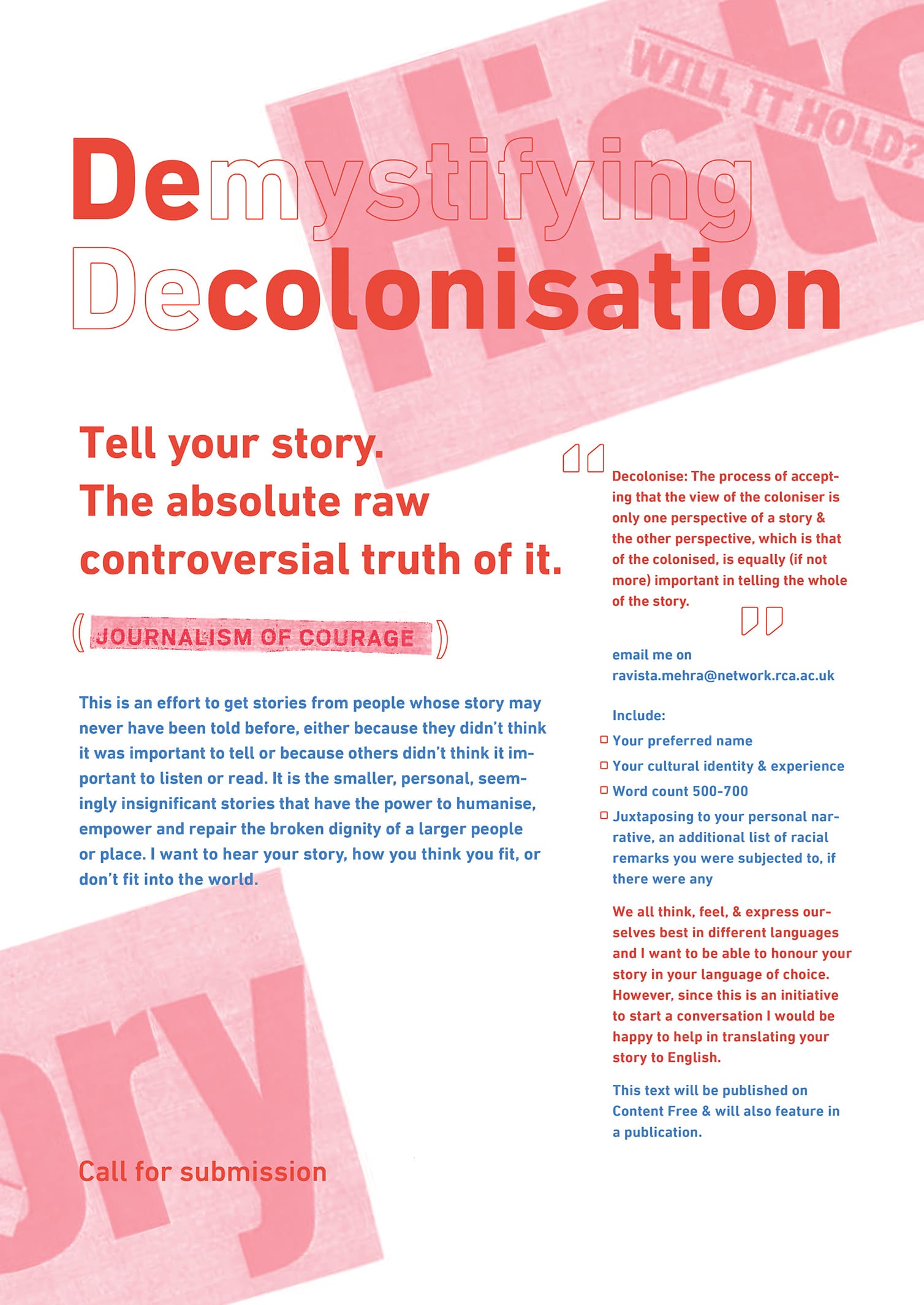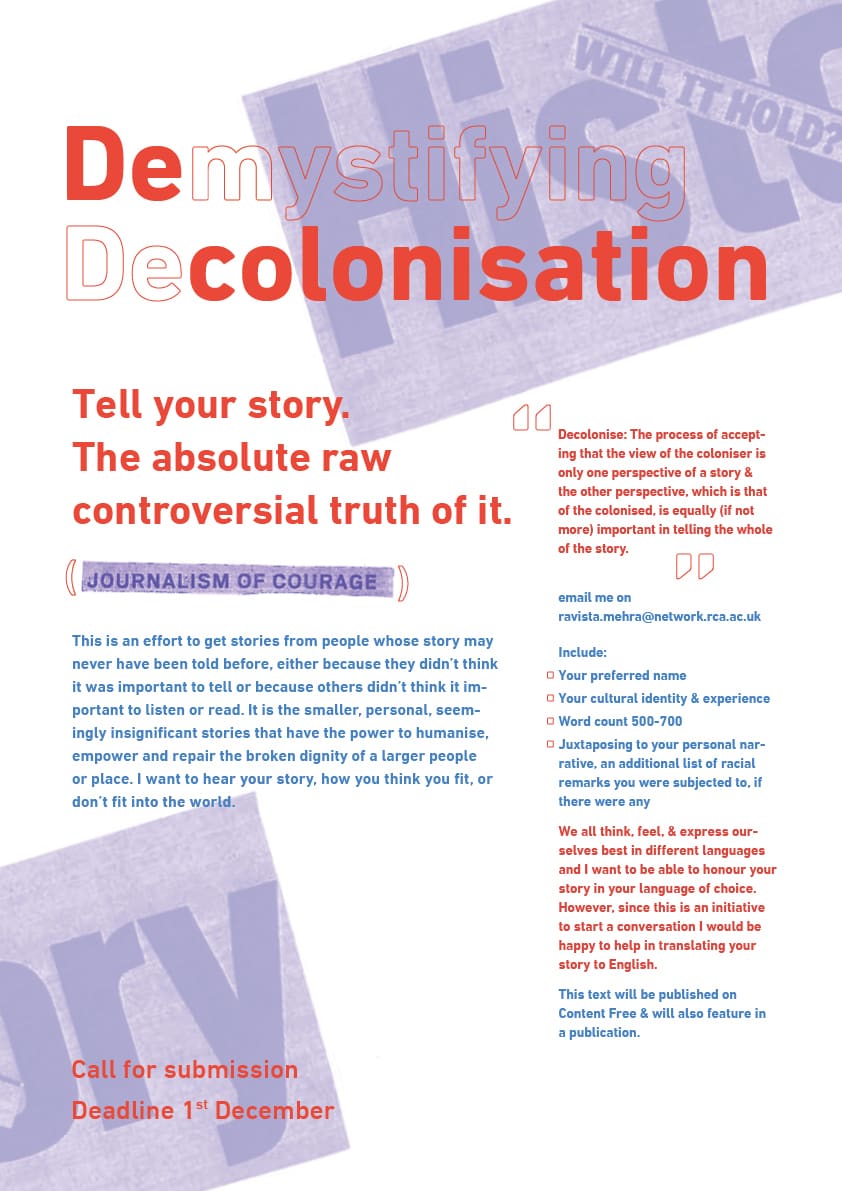


 January 20th, 2020
January 20th, 2020
 4:41 min read
4:41 min read  1289 words
1289 words
History is not our fault, but the future is our responsibility.
History — A collection of ‘stories’, written down, which form the lens of how the world is perceived and remembered.
Stories — A one-sided point of view of daily accounts that occur. Also can be fictional or non-fictional.
Decolonise — The process of accepting that the view of the coloniser is only one perspective of a story and the other perspective, which is that of the colonised, is equally (if not more) important in telling the whole story.
There is a lot of talk these days about decolonisation, especially regarding the institute and curriculum, since we are in an academic setting. However, how can we possibly tackle the massive monster that is decolonisation at such a large scale without tackling it at a personal level? In order to start the process of decolonising our history, geography, economics, literature, we have to first decolonise our own stories, which simply means looking back and reflecting on our cultural experiences growing up.
Chimamanda Ngozi Adichie says in her TED talk The Danger of a Single Story, that “the single story creates stereotypes, and the problem with stereotypes is not that they are untrue, but that they are incomplete. They make one story become the only story”. This column is an effort to get stories from people whose story may never have been told before, either because they didn’t think it was important to tell or because others didn’t think it important to listen or read. It is the smaller, personal, seemingly insignificant stories that have the power to humanise, empower and repair the broken dignity of a larger people or place.
— Ravista Mehra
Both sides of my family fled to India from the Pakistani side of Punjab, namely Lahore and Rawal Pindi, during the partition of 1947. They were ‘Hindus’ and had to relocate themselves across an arbitrarily drawn border to a region demarcated by the British for their ‘kind’. Hop, skip and jump. Except it was anything but that – it was a horrifying bloodshed for years to come. My grandparents were infants at the time and their identity was defined by that one unforgivable event.
What it meant to be ‘Indian’ in my family was defined in relation to what it meant to be Pakistani. Indians were apparently opposite to Pakistanis. As a child, I thought we must be so different if we were made to separate ourselves into different corners. I haven’t yet encountered a bigger myth in my adult life.
Unfortunately my grandparents, who as children got onto trains where they saw massacres, and who were handed viles of poison to drink if someone tried to rape them, can never forget or forgive those memories and move forward. I have realised after much debate with them that one should not expect them to. No one who has seen such cruelty between brothers and sisters, friends and neighbors can ever forgive such inhumanity. It is more important for the second and third generations to find a way to forgive and move forward together. It all sounds wonderful, but the reality is that the governments of both countries and their respective allies can’t afford peace, hence we continue to live in disharmony.
I picked up this interesting habit of labeling everything, of debating extensively on what was ‘mine’ versus ‘theirs’ in America, where I recently did my undergraduate degree. I grew up in a very traditional and conservative joint Indian family, where there was just ‘ours’. India, before the British Raj, was ‘ours’ – all the people who lived there. When the British departed it became ‘mine’ versus ‘theirs’. India. Pakistan. Bangladesh. What an incredible power it is to be able to label, demarcate or bifurcate. That’s exactly what happened to me upon my arrival in Boston Logan Airport. I was labeled ‘Indian’ and was expected to be all the vague traits that label carried with it. It was a blasphemy to the general public that their idea of me was completely untrue. I did not speak ‘Indian’ because it is not a language. I spoke fluent English, because the British colonised India. I was only supposed to eat ‘curry’ that is not a type of food but rather a heady mix of masalas (spices). My favourite assumption however, was that I went to school on elephants and lived in a slum. The relative lightness of my skin created much debate about if I was indeed fully Indian and not mixed race.
I never considered myself a patriot, instead I was itching to live the American dream. I had a pretty white washed education having only studied international syllabi even while living in India. Studying at The British School all my life segregated me from the Indian system of education and made me feel less ‘Indian’. As a child it excited me to be more like a foreigner because apparently there was novelty in that. Then I went to Rhode Island, which is about as white a place as I could find to ensure I saw the brown-ness of my skin. I then saw myself through the eyes of the West – a mysterious exotic woman. With every ignorant comment I questioned how it was that in India I was taught the entirety of Western history, but the Americans didn’t know where India was on the globe – even in the age of Google Maps. Why did I admire their way of life, when they didn’t even acknowledge mine? Why was I so desperate to whiten my accent and my food to become American, when there was nothing wrong with being Indian?
It was in my third year, after Trump’s inauguration where I saw racism turn from a concept to a reality. I had an identity crisis and started questioning who I was and what it really meant to be ‘Indian’. Was I ‘Indian’ because I was born and brought up in New Delhi or because my mother tongue is Punjabi? That Hindi music can make me feel emotions the English ones can’t even hint at? That only Indian food completely fills my stomach at the end of a long day? I couldn’t pinpoint the exact thing that made me an Indian, and still can’t. My guess is that it’s a mixture of the smells, colours, languages, foods and of course Bollywood that comes from my country.
November 2016 is when the colour line became undeniably present to me. We were divided on the basis of our skin colour and that meant I was brown, non-white, separate, other. It was a life-changing revelation, and not a pretty one. I didn’t want to see my friends based on their colour. I wanted to remain in my naivety – of diversity and equality being achievable goals. But I couldn’t live in a make-believe world and pretend that prejudices did not exist. Once you see colour it is really hard to unsee it. It has taken me three years and I still haven’t been able to completely unlearn my instinctive reaction, to group people and myself into clutters of colour. Unlearning is exhausting but it is essential. It is the only way forward.
I realised all the emotional energy spent on anger could be channelled into something more positive like working to change the course of our future. Even by doing something small like encouraging people who have similar histories to me to share them. To reclaim the place in history our ancestors rightly deserve and to honour the complex identities we have grown up with. Demystifying Decolonization is a result of that rechanneled anger.

History is not our fault, but the future is our responsibility. History — A collection of ‘stories’, written down, which form the le...

History is not our fault, but the future is our responsibility. History — A collection of ‘stories’, written down, which form the le...